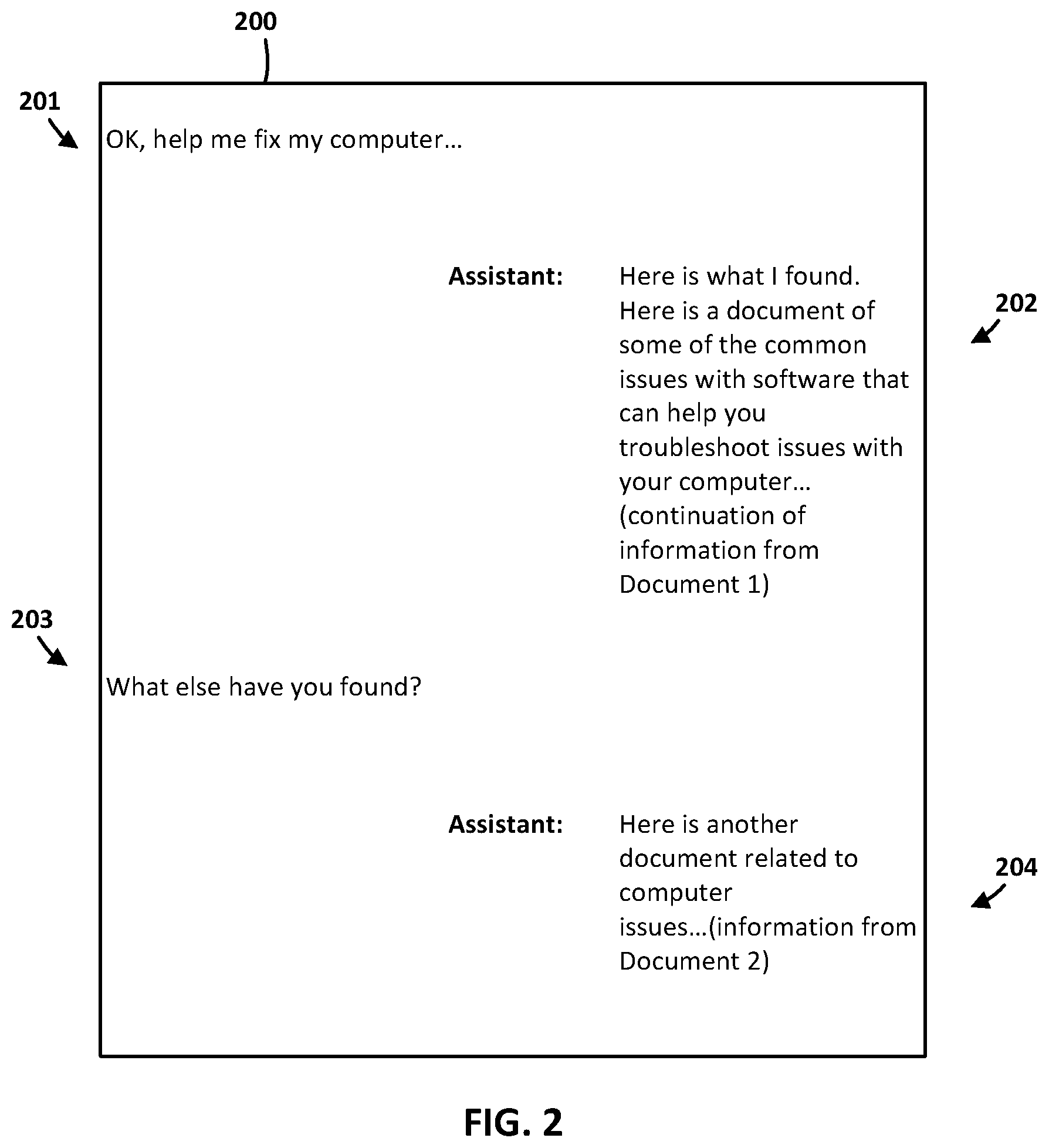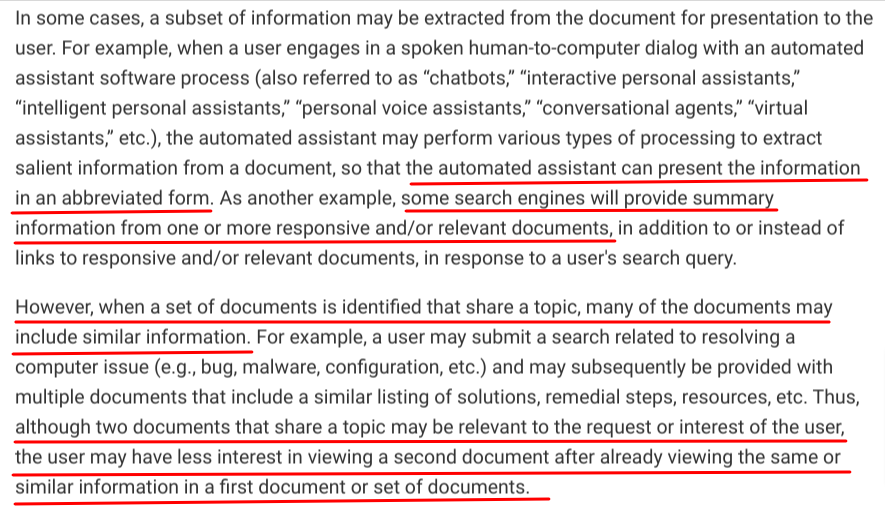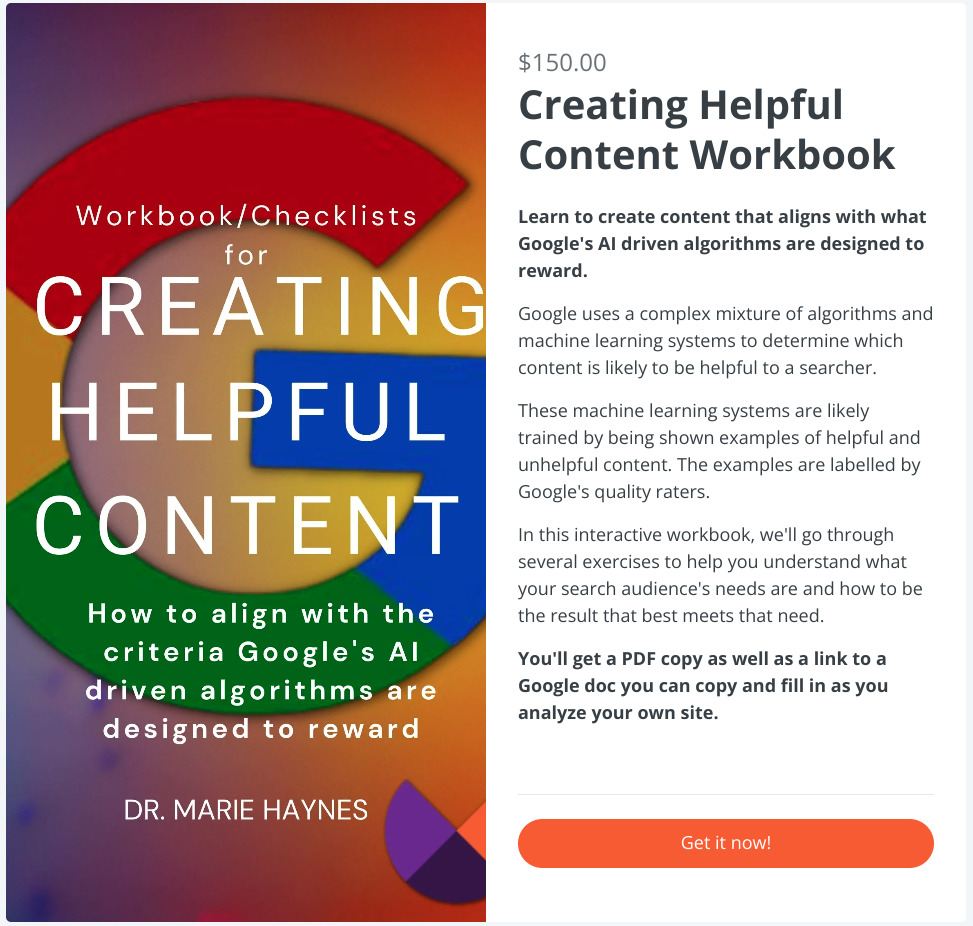Yesterday, Google made some changes to their helpful content system. I thought I’d write out my thoughts on what has changed.
As I’ve been teaching on making your “main content” be the part that meets the intent of your audience let me summarize the changes first. Actually, I’ve asked Claude to summarize my notes for you!
- Google has updated its algorithm to include the helpfulness of content hosted on your subdomains as a significant factor in evaluating your website’s overall usefulness to the audience. This may possibly address “parasite SEO” tactics.
- Google has modified its guidelines, shifting from “written by an expert” to “written or reviewed by an expert” – likely focusing on expert-level content rather than just author expertise.
- “Content written by people” changed to “content created for people” – may signal more openness to AI-generated content if high quality.
- Added note about not changing dates to seem fresher – perhaps freshness may be more rewarded in rankings now?
- Vague reference to adding/removing content – possibly about gaming freshness or topical authority with low-quality AI content.
- Focus should remain on creating truly helpful content that provides information gain, not just gaming systems.
Now let’s go through each of the changes in more detail.
The helpfulness of content on your subdomains impacts Google’s assessment of your entire site
Google said,
“If you host third-party content on your main site or in your subdomains, understand that such content may be included in site-wide signals we generate, such as the helpfulness of content. For this reason, if that content is largely independent of the main site’s purpose or produced without close supervision or the involvement of the primary site, we recommend that it should be blocked from being indexed by Google.”
It’s possible this wording was changed to address the tactic some have been using lately that some have called “parasite SEO.” If I understand the tactic correctly, it’s not exactly SEO. The idea is to purchase a sponsored post on a website. Then, place affiliate links in the content. They rank well because of the authority of the site. These posts are often on a subdomain dedicated to sponsored content.
Historically those subdomains were often treated as separate from the root domain:
Now, Google is saying that when their systems make judgments of whether your site produces helpful content, the helpfulness of the content on subdomains can impact this assessment.
As a reminder, an unhelpful content classification is a site wide signal. It can impact the rankings of even your good, helpful content.
In short: Google is now factoring in the helpfulness of content on your subdomains when evaluating the overall helpfulness of content on your entire site.
What Does This Mean for Parasite SEO Tactics?
The recent shift in Google’s evaluation criteria has significant implications for what some term as “Parasite SEO” tactics. Previously, these strategies involved placing sponsored posts with affiliate links on high-authority websites, often in dedicated subdomains, to capitalize on the site’s credibility. However, Google’s new focus on assessing the “helpfulness” of content across subdomains means that such tactics could now adversely affect the entire website’s search ranking.
It’s a clear signal that Google aims to curb the efficacy of these methods by tying the quality of subdomain content to the overall evaluation of a site. This makes it increasingly important for site owners to exercise greater scrutiny over the content they allow on their platforms, including subdomains, to maintain a strong, helpful content profile in Google’s eyes.
Added: “reviewed by an expert”
Google’s guidance on creating helpful content used to say, “Is this content written by an expert?”
They have changed it to say, “Is this content written or reviewed by an expert.”
This makes sense to me. What makes expert content more likely to be helpful, is not that it was written by a topic expert, but that it is is expert level content. Or, in situations where there are no professionally recognized experts, true enthusiast-level content.
This is not likely something you can game by slapping a “reviewed by” author byline on your posts.
Changed: “Content written by people” changed to “content created for people”
This change can mean a few things.
It’s possible Google is opening the door here for more use of AI to help create content.
Is AI-Generated Content Now More Acceptable?
Google is not against AI content. In fact, their guidance on AI content tells us their focus is “on the quality of content, rather than how content is produced.” They tell us that not all automation is spam.
“AI has the ability to power new levels of expression and creativity, and to serve as a critical tool to help people create great content for the web.”
There are many ways we can use AI to improve the helpfulness of our content. For example, I used Claude to summarize this article you are reading into bullet points to put at the top of the article.
It’s also possible this change means something else. “Content written by people” is text. “Content created for people” would also include images and video.
As we’ve discussed in newsletter, Gemini, Google’s new upcoming model understands not only text like GPT or PaLM, but also images and video.
Is freshness going to be better rewarded?
Google added,
“Are you changing the date of pages to make them seem fresh when the content has not substantially changed?”
Perhaps this means that Google will be putting more emphasis on freshness as a characteristic of helpfulness?
Google has several systems that are designed to show fresher content when it might be helpful to the searcher.
No, you’re not likely to be penalized for trying to fake your date. But it’s unlikely to help you if you’re doing this. Google can tell whether content is legitimately fresh.
Freshness is discussed in section 18.0 of the quality rater guidelines: Needs Met Rating and Freshness:
“When a query demands recent content, only pages with current, recent, or updated content should get high Needs Met ratings. For these queries, pages about past events, old product models and prices, outdated information, etc. are not helpful. They should be considered “stale” and given low Needs Met ratings. In some cases, stale results are useless and should be rated FailsM .
For some queries, there may be “newsy” or recent information user intent, as well as more “timeless” information user intent. Users issuing queries for celebrities or politicians may be interested in biographical information, or users may be looking for the latest news or gossip.
Freshness is generally less of a concern for Page Quality rating. “Stale” pages can have high Page Quality ratings. For example, some highly reputable news websites maintain “archival” content. However, unmaintained/abandoned “old” websites or unmaintained and inaccurate/misleading content is a reason for a low Page Quality rating.”
My summary: When it would help to meet searcher intent by providing something that’s fresh, Google wants to recommend fresh content. This doesn’t mean that all “old” content is stale or is likely to hurt you. It just may be less likely to be shown to searchers if they could be better helped by something fresh and new.
It is also worth noting that quality raters are told that sometimes sites try and fake last updated dates in order to appear fresh.
“Note : The date the page was created may be different from when the content was last updated or modified. When content is updated, the page will sometimes show the date of the update, not the date the page was created. Some websites always show the current date, regardless of when the content was last updated. If you are curious about the content of a page, see here to try the “Wayback Machine” on the Internet Archive. Not all pages are available, but this tool may help you understand how some pages were created and how their content has changed over time. “
On adding or removing content
Google added this to the helpful content documentation:
Are you adding a lot of new content or removing a lot of older content primarily because you believe it will help your search rankings overall by somehow making your site seem “fresh?” (No, it won’t)”
The helpful content documentation emphasizes removing unhelpful content as a road to recovery. Yet, they’re vague on what that means.

I can think of two possible meanings for this update to the helpful content system documentation.
1) It’s possible Google is worried about people gaming freshness
If my assumption above is right, we may find that this update strongly promotes content that is new and fresh. This might encourage publishers to just get content out there to remain fresh, even if it’s not terribly helpful. Be careful not to produce content just for the sake of creating content. It may lead to a sitewide unhelpful content classification.
2) This might be about sites gaming topical authority with AI content
Topical authority is a buzzword in SEO right now. And for good reason. When we think about what Google has said about the topic layer of the knowledge graph and upcoming updates designed to surface articles with “unique expertise on a topic”, it’s easy to see that producing content about your topics is important.
I recently was asked by Time to dig into a situation where a site was using AI to create millions of pages of content all clustered into topic hubs.
It makes sense to me that Google’s systems can make decisions on whether you’re likely to know a lot on your topic based on the content that you produce. The more I publish on the helpful content system, for example, the more I demonstrate to Google’s systems that my site is relevant to this topic. (Look at me producing fresh content!)
The blackhats attempting to exploit topical authority, however, are not taking into account helpfulness. This content may seem semantically relevant to search engines, but it usually lacks expertise, experience, original insight and the other things Google has told us users tend to find helpful. These are the things their AI systems like the helpful content system are built to reward.
In the case that Time investigated, this content consisted completely of information that is already known on the web.
We’ve been talking in newsletter lately about a Google patent that discusses information gain. I hope to write much more on this. Google wants to rank content that provides the searcher with information that is helpful to them beyond the other content they have been shown.
One of those other sources talked about in the patent is an AI assistant.
I am fairly certain that a Gemini powered SGE will soon be the default way we “search” or perhaps a better phrase is “get answers”. When the known information in the world can be summarized by AI, it’s only those websites that provide information gain that people will seek out beyond an AI generated answer. I think there’s a lot to be gained here for those of us who learn how to create this type of content!
Perhaps this helpful content update will impact sites that have previously benefited from exploiting how Google understands topical authority.
One added thought here. I think that topical authority is incredibly important. If you are able to produce lots of content on your topic that actually is truly helpful to your audience, this is likely to help improve the chances that Google wants to show your content to people searching on your topics.
Summary
- “In this update, Google emphasizes the ‘helpfulness’ of content, even on subdomains.”
- “Expert-level content gets a boost, whether written or reviewed by an expert.”
- “AI-generated content isn’t off the table, as long as it’s high-quality.”
- “Freshness might be a more significant factor going forward.”
I’ll be watching as this update rolls out and will report in newsletter on what both I and the community are seeing.
I wish you the best of luck with your rankings!
Marie








Comments are closed.